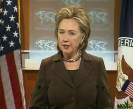|
 Wednesday, 27 January 2010 23:58 Wednesday, 27 January 2010 23:58
LONDON (Reuters)
Yemen must act to push through reforms to tackle the root causes of poverty and instability fuelling militancy in the country, U.S. Secretary of State Hillary Clinton told an international conference on Wednesday.
After the conference on Yemen in London, the foreign ministers of Yemen, Britain and the United States told a joint news conference Yemen's problems required a broader range of solutions than a simple crackdown on al Qaeda affiliates.
"Now is the moment for the Yemeni government to step up and do what it has said it will do. It has an economic plan, it has a reform agenda, and it is time for them to implement that," Clinton said.
In a bold message that raised the stakes as international concerns gather about Yemen, Clinton said that Yemen and the rest of the world cannot stand idle as the nation where almost half of its 23 million people live on less than $2 a day slides further into lawlessness.
"We look to Yemen to enact reforms and continue to combat corruption and improve the country's investment and business climate," she told the meeting.
"And if conflict and violence go unaddressed, they will undermine the political reform and reconciliation that are essential to Yemen's progress," she added.
At the meeting which also included Gulf foreign ministers, Yemen said it would push ahead with political reform and start discussions with the International Monetary Fund about a program to boost its economy.
British Prime Minister Gordon Brown, anxious to prevent Yemen becoming a failed state, called the London talks after a Yemen-based al Qaeda affiliate said it was behind an abortive bid to blow up a U.S.-bound plane with 300 people on board.
Britain's Foreign Secretary David Miliband said the assault on Yemen's problems cannot begin and end with its security challenges and its counter-terrorism strategy.
"In tackling terrorism it is vital to tackle its root causes. In Yemen's case these are manifold -- economic, social and political," he said.
RADICALISATION DISPUTE
Clinton said the challenges of Yemen, which faces a Shi'ite Muslim revolt in the north, secessionist unrest in the south, water shortages, falling oil income and growing militancy, were daunting.
"But we also recognize that Yemen's challenges are not going to be solved by military action alone. Progress against violent extremists and progress toward a better future for the Yemeni people -- including economic opportunity, health and education, and open and responsive government institutions..."
"To help the people of Yemen -- we, the international community -- can and must do more. And so must the Yemeni government."
Major powers have committed to supporting Yemen in its fight against al Qaeda by strengthening their counter-terrorism capabilities and improving aviation and border security.
The December 25 attack on a Detroit-bound jet drove home how al Qaeda could threaten Western interests from Yemen and highlighted the risk that it could become a failed state, compounding security challenges already posed by lawless Somalia just across the Gulf of Aden.
REGIONAL RISK
The joint statement released at the end of the two-hour meeting underlined the threat Yemen posed to neighbors including Saudi Arabia, the world's top oil producer.
"The challenges in Yemen are growing and, if not addressed, risk threatening the stability of the country and broader region," the statement said, affirming Yemeni sovereignty.
It was not a pledging conference and no fresh money was put on the table.
A donors' meeting in London in 2006 pledged about $5 billion for Yemen but only a small portion has been disbursed, partly because of concerns about how the money would be spent.
The meeting in London, on the eve of a major summit on the future of Afghanistan, is likely to be the first in a series.
The statement said another follow-up meeting will be held in Riyadh at the end of February.
Wednesday's talks brought together the Group of Eight world powers, Yemen's neighbors in the Gulf Cooperation Council (GCC), and Egypt, Jordan and Turkey.
Keen to harness U.S. support and funding, Yemeni President Ali Abdullah Saleh, 67, has sought to paint his internal foes as all somehow linked to al Qaeda
|

